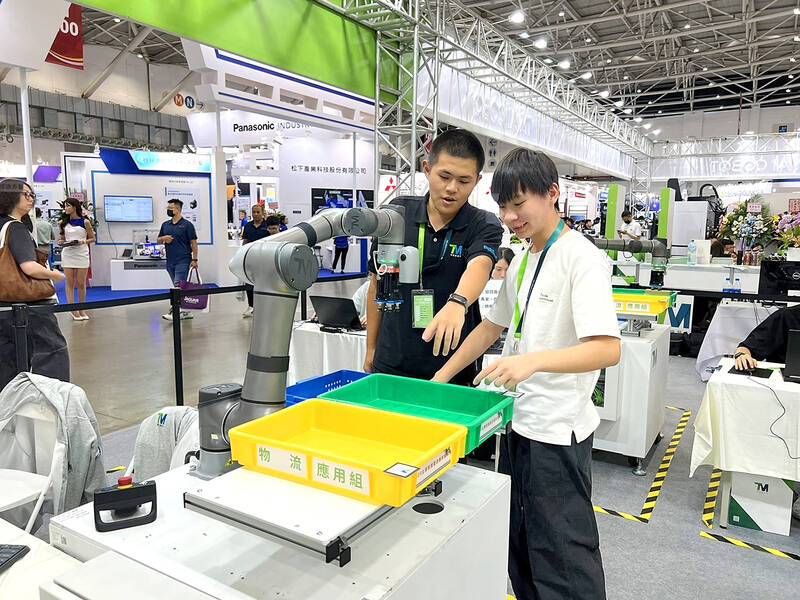Taiwan’s manufacturing output in the fourth quarter of last year rose 9.44 percent year-on-year to NT$5.05 trillion (US$154.21 billion), the highest in the past 10 quarters, the Ministry of Economic Affairs said in a report yesterday.
It was the fourth consecutive quarter of annual growth in manufacturing output, following increases of 10.47 percent in the third quarter, 14.31 percent in the second quarter and 4.76 percent in the first quarter, the report said.
The ministry attributed last quarter’s increase to continued production growth in the information technology and electronics industries, driven by robust demand for applications related to artificial intelligence (AI), high-performance computing (HPC) and cloud data services, coupled with stocking demand ahead of the Lunar New Year holiday, it said.

Photo: CNA
The production value of the electronic components industry — the manufacturing sector’s most important segment, with a 35.24 percent share of the total output — increased by an annual rate of 19.37 percent to NT$1.78 trillion, as a 26.81 percent rise in semiconductor output offset a 2.91 percent retreat in the production of flat panels and related components, it said.
The production value of computer and optical product suppliers, accounting for 8.87 percent of the manufacturing sector’s total output, soared 25.49 percent to NT$448.3 billion, the highest quarterly level ever, due to solid demand for AI devices and cloud-based servers, it said.
However, the uneven recovery in global end-market demand resulted in mixed output performance in traditional industries, where the reported production value of chemical material and fertilizer suppliers decreased 2.73 percent, while firms in the vehicle industry posted an 11.3 percent decline.
The output of base metal product makers increased 1.08 percent and producers of machinery equipment posted an 8.95 percent rise, the report said.
For the whole of last year, Taiwan’s manufacturing output increased 9.75 percent from a year earlier to NT$19.31 trillion, it added.
While the development of emerging applications related to AI and HPC, as well as the strong demand for advanced semiconductor chips and servers, are expected to continue supporting Taiwan’s manufacturing sector, a US-China technology rivalry, geopolitical conflicts and global trade protectionism pose uncertainties for the sector, the ministry said.

Anna Bhobho, a 31-year-old housewife from rural Zimbabwe, was once a silent observer in her home, excluded from financial and family decisionmaking in the deeply patriarchal society. Today, she is a driver of change in her village, thanks to an electric tricycle she owns. In many parts of rural sub-Saharan Africa, women have long been excluded from mainstream economic activities such as operating public transportation. However, three-wheelers powered by green energy are reversing that trend, offering financial opportunities and a newfound sense of importance. “My husband now looks up to me to take care of a large chunk of expenses,

State-run CPC Corp, Taiwan (CPC, 台灣中油) yesterday signed a letter of intent with Alaska Gasline Development Corp (AGDC), expressing an interest to buy liquefied natural gas (LNG) and invest in the latter’s Alaska LNG project, the Ministry of Economic Affairs said in a statement. Under the agreement, CPC is to participate in the project’s upstream gas investment to secure stable energy resources for Taiwan, the ministry said. The Alaska LNG project is jointly promoted by AGDC and major developer Glenfarne Group LLC, as Alaska plans to export up to 20 million tonnes of LNG annually from 2031. It involves constructing an 1,290km

NEXT GENERATION: The company also showcased automated machines, including a nursing robot called Nurabot, which is to enter service at a Taichung hospital this year Hon Hai Precision Industry Co (鴻海精密) expects server revenue to exceed its iPhone revenue within two years, with the possibility of achieving this goal as early as this year, chairman Young Liu (劉揚偉) said on Tuesday at Nvidia Corp’s annual technology conference in San Jose, California. AI would be the primary focus this year for the company, also known as Foxconn Technology Group (富士康科技集團), as rapidly advancing AI applications are driving up demand for AI servers, Liu said. The production and shipment of Nvidia’s GB200 chips and the anticipated launch of GB300 chips in the second half of the year would propel

‘MAKE OR BREAK’: Nvidia shares remain down more than 9 percent, but investors are hoping CEO Jensen Huang’s speech can stave off fears that the sales boom is peaking Shares in Nvidia Corp’s Taiwanese suppliers mostly closed higher yesterday on hopes that the US artificial intelligence (AI) chip designer would showcase next-generation technologies at its annual AI conference slated to open later in the day. The GPU Technology Conference (GTC) in California is to feature developers, engineers, researchers, inventors and information technology professionals, and would focus on AI, computer graphics, data science, machine learning and autonomous machines. The event comes at a make-or-break moment for the firm, as it heads into the next few quarters, with Nvidia CEO Jensen Huang’s (黃仁勳) keynote speech today seen as having the ability to